KeySearch Review 2026: $17/Month vs Ahrefs $99/Month - Is This SEO Tool Worth It?
Table of Contents
Here is my review of Keysearch, an all-in-one keyword research tool, rank checker, and backlink checker that is a much cheaper alternative to Ahrefs and Semrush. Find out if the Keysearch SEO tool is for you.
As internet marketers and small business owners, we always look for that one SEO tool that can make a difference. That one tool that will set us apart and give us an edge over the competition.
Ahrefs is one of those tools. Semrush is another. They are some of the best (if not the best) SEO tools on the market.
But, they have become out of reach for bloggers, small business owners, and niche website builders. Why? Because of their expensive prices.
That’s where Keysearch comes in.
What is Keysearch?
Keysearch is an all-in-one SEO tool that comes with keyword, SERP and competitor research, and analysis, keyword rank checking, backlink analysis plus loads more.
It’s an affordable all-in-one SEO tool that comes with:
- Keyword research
- Competitor analysis
- Explorer (domain overview)
- Rank tracking and intelligence
- YouTube research
- Content assistant
Keysearch will help you uncover hidden gem keywords that are easy to rank while also giving you all the tools you need to spy on your competitors and track your SEO efforts.
Full Disclosure: My Bias in This Review
I earn affiliate commissions from KeySearch when you sign up through my links. Here’s what that means:
KeySearch:
- I earn approximately $5 per sale (much less than most affiliate programs)
- Why I recommend it: Genuinely 85% cheaper than Ahrefs ($17/month vs $99/month)
- The low commission means I’m not incentivized to oversell it
What I actually use: I use KeySearch for quick keyword research and content ideation Monday-Thursday. I also maintain an Ahrefs subscription ($99/month) that I use for deep backlink analysis and client work.
If I were purely profit-driven:
- I’d only recommend expensive tools with higher commissions
- I’d never admit KeySearch has a smaller database than Ahrefs
- I’d hide the fact that KeySearch is slower and USA-only
Instead, I’m ranking by actual value for different user types.
You shouldn’t trust me blindly. Verify the pricing, feature comparisons, and user reviews yourself using the sources I link throughout this article.
My honesty level: 6/10 - I earn very little from KeySearch ($5/sale), so I have minimal financial incentive to oversell it. The 85% cost savings vs Ahrefs is objectively real and matters for bloggers and small businesses. I’ll clearly show you when Ahrefs is worth the premium despite my earning nothing from recommending it.
Here, I will share with you the good and the bad of Keysearch and how it stacks up against big giants like Ahrefs (but also Semrush, Majestic, Moz, and Mangools).
Plans & Pricing
Keysearch offers much cheaper plans than Ahrefs. Their plans start at just $17/month, while Ahrefs’ plans start at $99/month, and even if there’s an Ahrefs discount or Ahrefs coupon - it still makes it much more expensive. And you can’t bargain with Ahrefs, unfortunately.
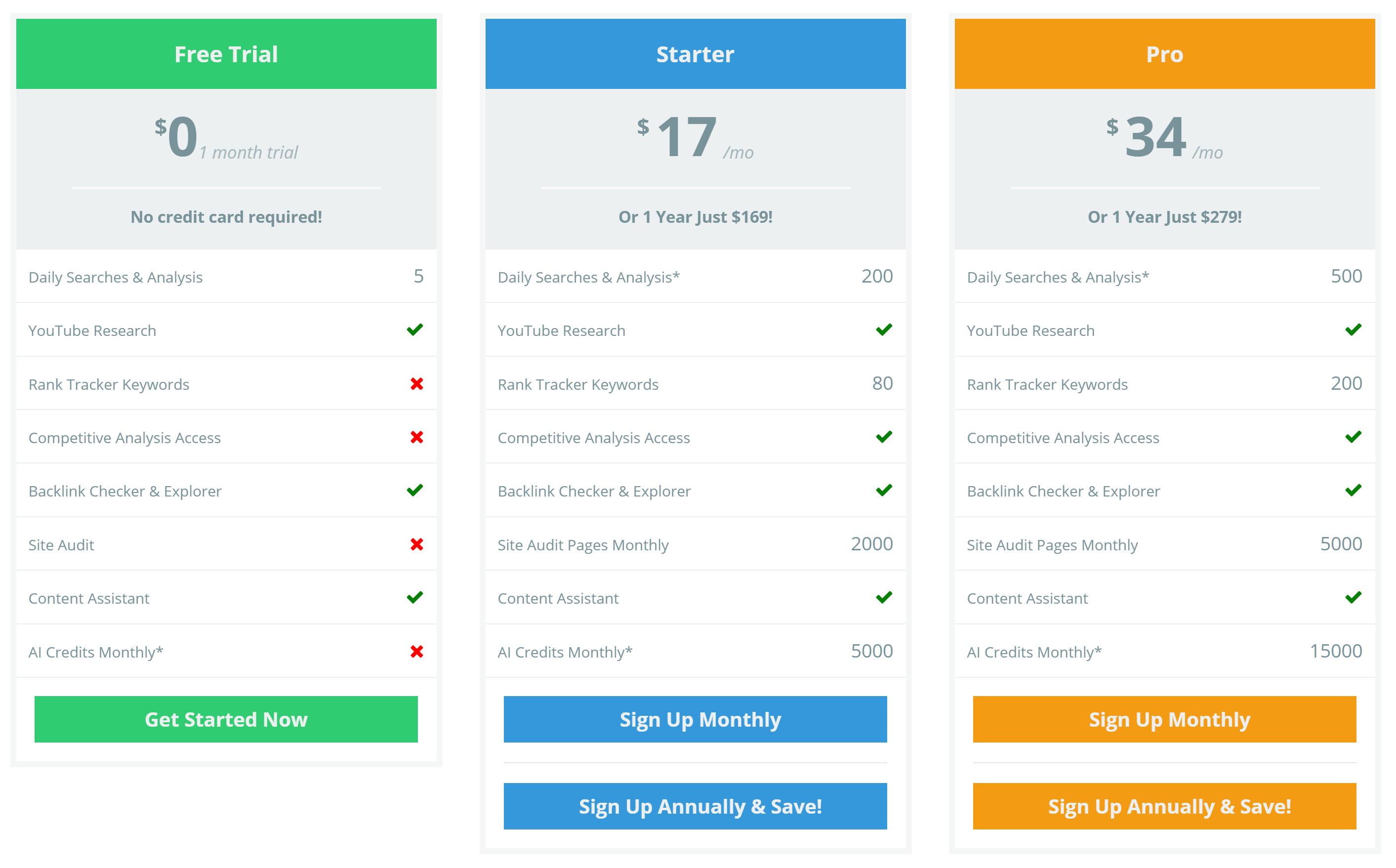
Right now you can use this Keysearch coupon code and get 20% off your purchase of Keysearch. KEYSEARCH 20% OFF DISCOUNT CODE: KSDISC
Keysearch is a much cheaper alternative to Ahrefs. From just $17 a month (or $13 when the coupon code is applied), you get 200 daily search and analysis credits.
This tool comes with dozens of features like:
-
Keyword Research
-
Backlink Analysis
-
Keyword & SERP Difficulty Checker
-
Keyword Rank Tracking
-
YouTube Keyword Research
-
Competition Analysis
-
Backlink Finder
-
Chrome/Firefox Addon
-
API Access
-
White-Label Reporting
-
and much more
We will go over each of these features in the following sections:
Keyword Research
Keysearch offers a beginner-friendly interface for Keyword research. It not only allows you to find the best keywords to target (with the Keyword Research Tool).
It also allows you to quickly check the difficulty of any keywords you are looking forward to targeting (with the Quick Difficulty Tool):
Keyword Research Tool
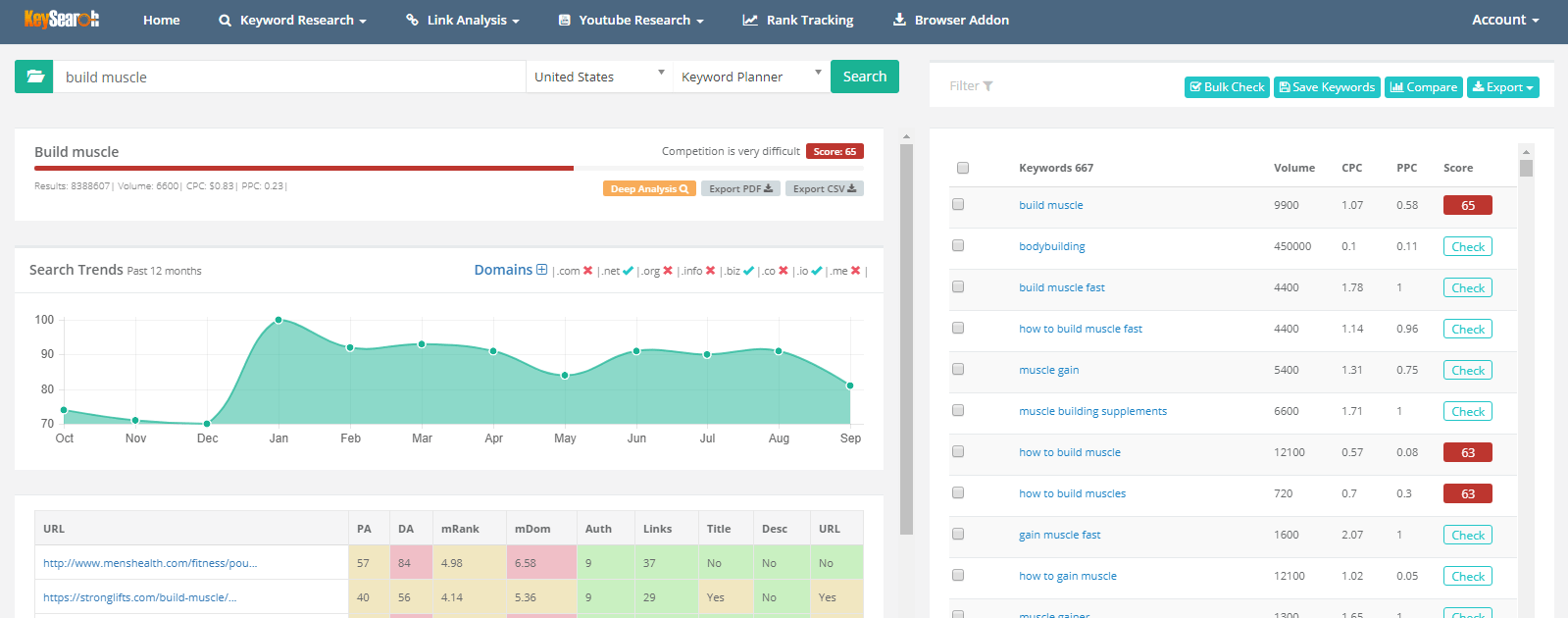
The keyword research tool offered by Keysearch allows you to measure a keyword’s difficulty and see who is ranking on the first page.
This tool allows you to check whether or not you should target a keyword-based on its level of difficulty. This can save you a ton of time and money on writing content.
One thing that I really like about this tool is that it displays all important details you need to consider about a keyword before you target it in one simple box:

This tool also offers hundreds of keyword suggestions for you to consider:
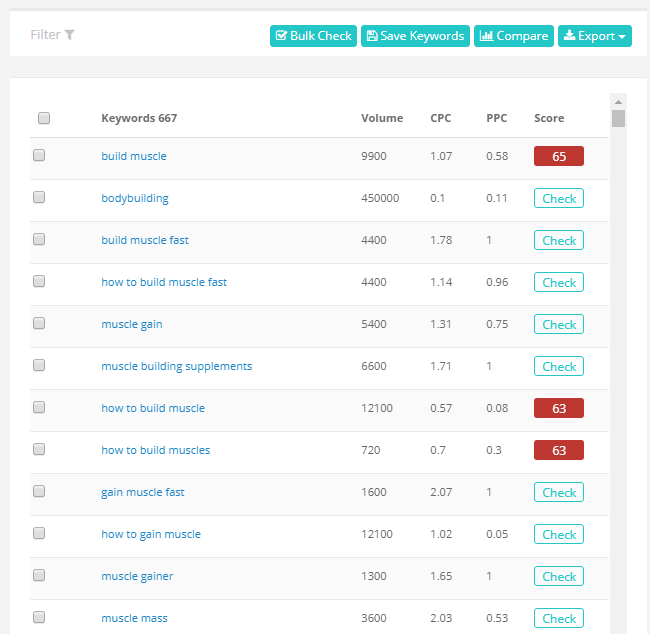
These keyword suggestions are displayed with both their volume and difficulty. If you click any of the keywords displayed in the suggestions, you will be able to see a complete analysis of the keyword.
Another thing that I really like and find helpful is this tool’s Search Results table:
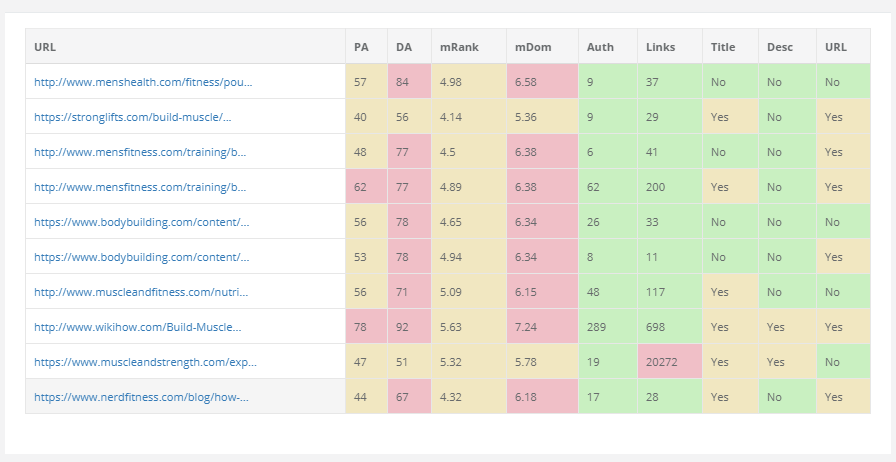
The table shows you a matrix containing all the important SEO metrics you need to consider about the sites ranking on the first page.
This gives you a quick overview of who is ranking for which keyword and at what position.
The one thing that I dislike about this table is that it doesn’t show you the title of the pages ranking for the keyword.
It does, however, tell you if a page contains the keyword in the title but doesn’t tell you what the actual title is.
To check the title of the page, you will have to either search for the keyword on Google or visit the page URL.
This tool also displays the search engine suggestions that are displayed at the end of search result pages:

This helps you identify the keywords people use to search for similar things. Don’t ignore these suggestions. These are the long-tail keywords you should include in your content.
This tool also allows you to export a CSV or a PDF file containing the details about the Keyword like its search volume, difficulty and all the sites ranking on the first page.
It allows you to get Keyword data and suggestions from Google Adwords Keyword Planner, YouTube Suggest, Bing Suggest, Keysearch Database and many others:
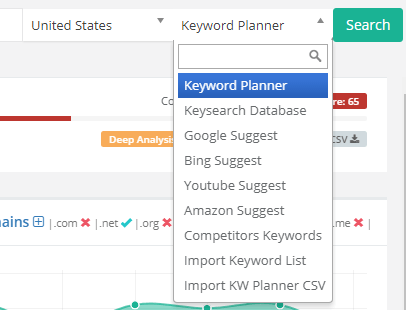
Quick Difficulty Checker Tool
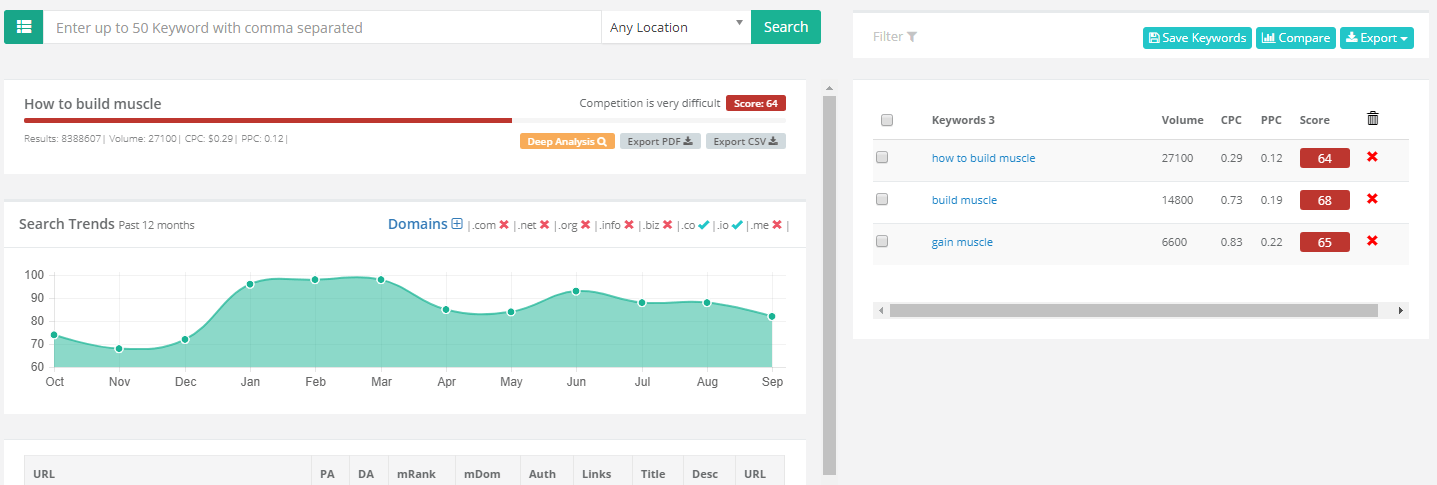
This tool is a huge time-saver. Instead of checking the keyword difficulty and volume for one keyword at a time, you can use this tool to build-check the difficulty of up to 50 keywords at once.
It also allows you to export the keywords along with their search volume and other details to a CSV file.
Backlink Analysis
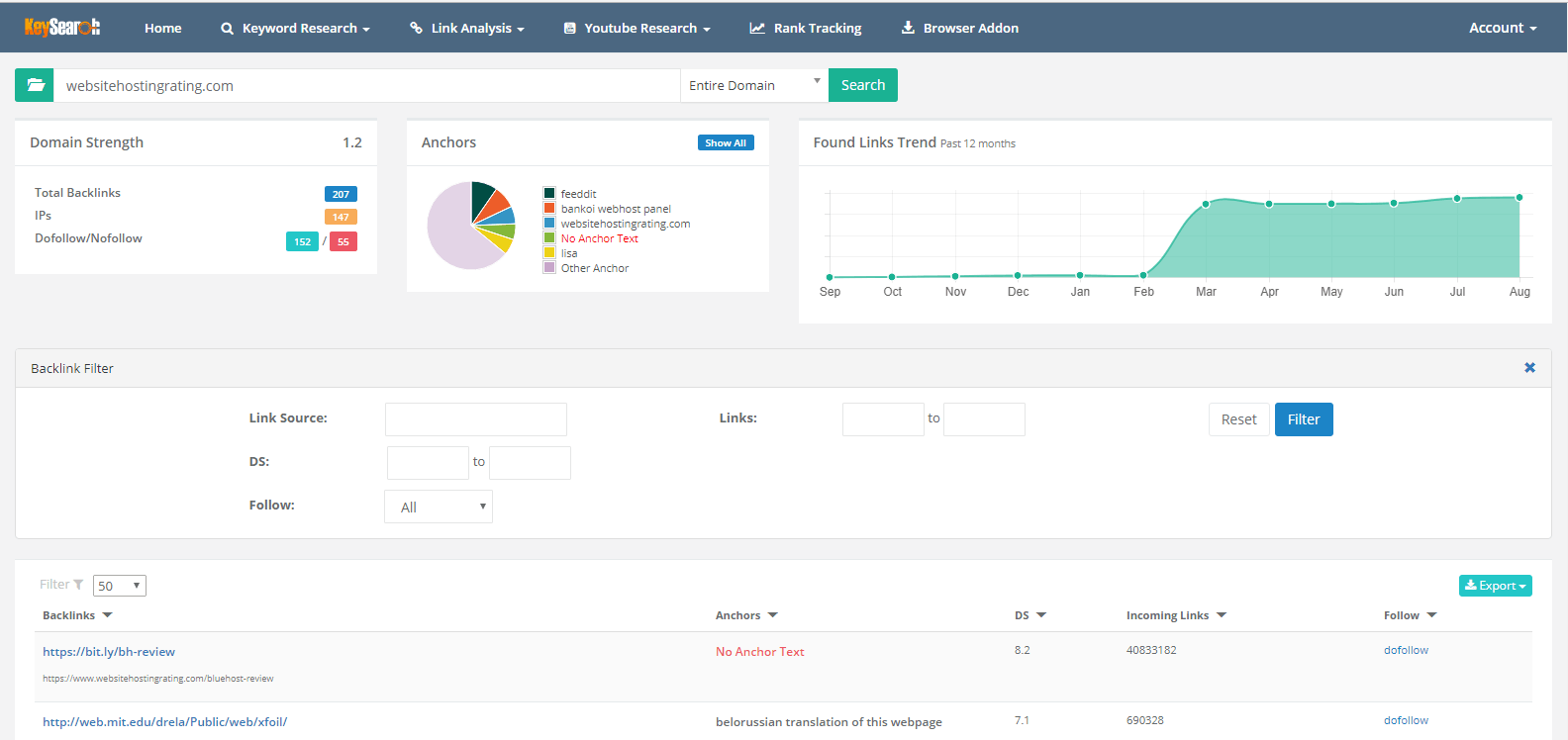
The backlink checker tool is one of the most important parts of any SEO tool. Keysearch’s backlink analysis tool comes with a lot of great features.
It allows you check the backlinks to the entire domain or just a specific page.
This tool offers a metric called Domain Strength that to help you judge a website’s quality. This is a good metric to check when looking for quality websites to guest post on or get a link from:
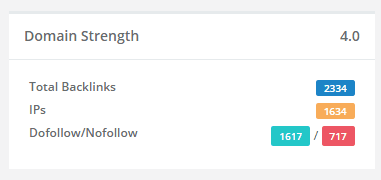
It also allows you to see an overview of link-building trends for the past 12 months for the domain or page you are checking. This helps identify how difficult it will be to outrank a domain or a page.
You can easily filter backlinks based on multiple metrics such as the number of links, domain strength, link source and type of link (dofollow or nofollow):

This tool allows you to view 50, 100, 250, 1000, or all the backlinks at once. It also allows you to export the backlinks of any given website or page.
One thing that I don’t like about this export functionality is that it will only export all the backlinks if you choose to display all the backlinks in your browser.
This is not only memory intensive but might also cause your browser to stop working.
The backlinks of any given page or website are displayed in a table along with the metrics and details such as Anchor Text, Domain Strength (Keysearch’s custom metric), Number of Incoming Links and whether or not the link is dofollow:
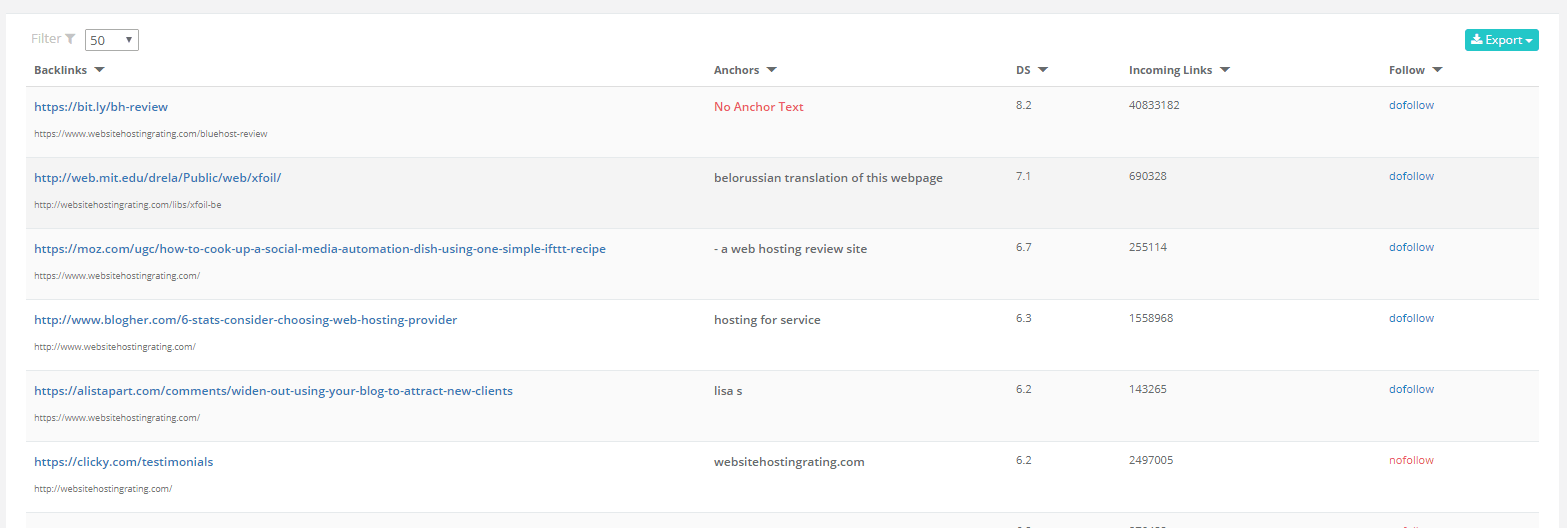
Youtube Research
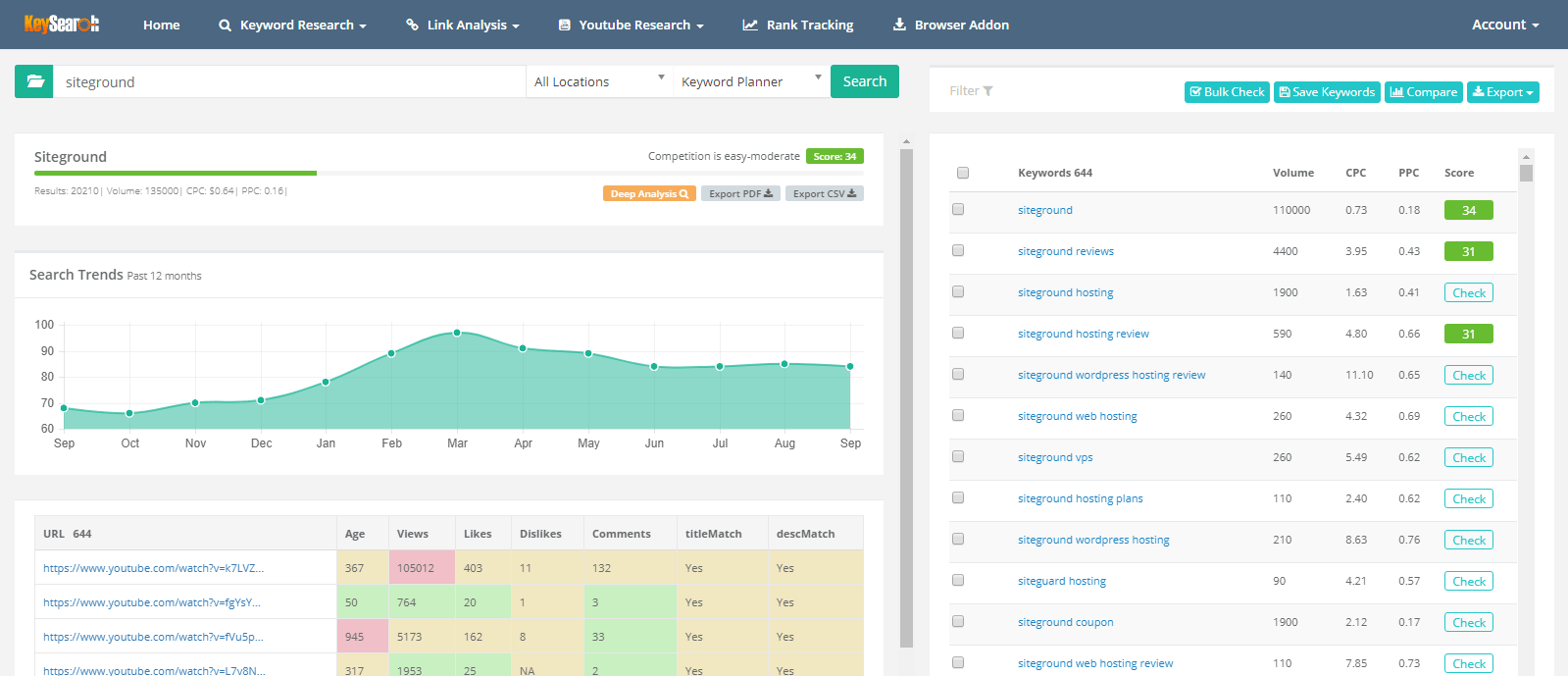
If you are a YouTuber, you will love this tool. It allows you to find the best keywords to target and the amount of competition for any given keyword.
This tool looks just like the Keyword Analysis tool. It comes with a Table just like the one offered by Keyword Analysis Tool.
The table displays URLs of the videos along with important metrics such as Video Age, Views, Likes, Dislikes, Comments and whether or not the keyword is in title and description.
Just like the Keyword Analysis tool, the only thing I don’t like is that the table doesn’t display the title of the page alongside the URL.
You will have to either manually search for the keyword on Google or in this case open each and every video to check their title.
This tool offers a keyword suggestion box similar to that of Keyword Analysis Tool on the right with multiple keywords you might want to consider.
Just like the Keyword Research Tool, there is a quick difficult checker available for YouTube as well. It allows you to check the difficulty and other metrics of up to 50 keywords at once:

Keyword Rank Tracker Tool
Keyword rank tracking is an amazing tool from Keysearch that helps you check whether or not your SEO efforts are working. It allows you to track the position your website is ranking for a keyword.
This is really useful when you try a new link-building campaign. With this tool, you can easily identify which SEO tactics work and don’t work for your website and your industry.
You can set up email notifications so that you receive an email from the tool as soon as there is a change in your search engine ranking for a given keyword.
Once you add a keyword to the tool, it generates a graph of all previous ranking positions since the day you added the keyword:
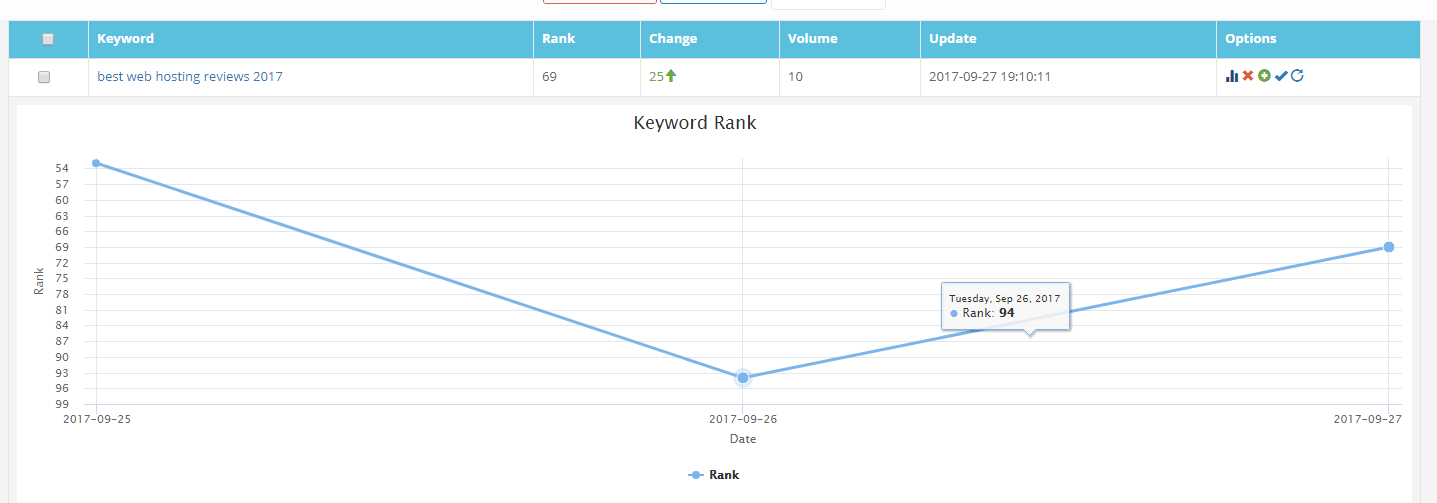
This tool is great if you do client SEO work. You can easily send your clients reports on whether or not your SEO efforts worked.
Unlike other rank tracking tools I have used in the past, this tool’s interface is a little different and a bit complex to understand. Once you understand how it works, you will have no problem using it.
Browser Addon
The browser add-on, such as keyword difficulty checker, allows you to analyze Keyword Difficulty right from your browser.
Once you install the browser extension, you can see the keyword difficulty and the Search Results Matrix table with all the important metrics about the pages showing up in search results.
This can save you a lot of time. There are times when you stumble upon keywords in your niche through Google.
Instead of logging into your Keysearch account, you can see the Keyword difficulty and important metrics about the search results without leaving the page.
One thing I think would be helpful is if the extension also displayed the search volume for the keyword.
Real User Complaints About KeySearch
Sources: Trustpilot, BlackHatWorld, Reddit, and user review sites from 2024-2025
Problem #1: Billing Issues
Multiple users on Trustpilot report serious billing problems. One user discovered a duplicate charge that ran for 15 months, with KeySearch refusing to refund more than 2 months of the unauthorized charges.
Why this matters: If you’re not carefully monitoring your credit card statements, you could be paying for duplicate subscriptions without realizing it.
Who this affects: Anyone not checking bank statements regularly, users with multiple subscriptions.
Problem #2: Difficult Cancellation Process
Users report that the cancellation button doesn’t work properly, making it difficult to cancel subscriptions. While customer service eventually responds, users find it disappointing that the company makes cancellation unnecessarily difficult.
Why this matters: “Dark patterns” in cancellation flows are a red flag. You should be able to cancel as easily as you signed up.
Who this affects: Users who want to trial the service or need to cancel due to budget constraints.
Problem #3: Performance and Speed Issues
SEO professionals note that KeySearch is noticeably slower than competitors like SEMrush and Ahrefs. Users report lag when loading keyword data and generating reports.
Why this matters: Time is money. If you’re doing bulk keyword research, slow loading times add up.
Who this affects: Power users, agencies doing client work, anyone researching hundreds of keywords per day.
Problem #4: Limited Database Size
KeySearch is described as a “fairly young tool” with a smaller database of keywords and backlinks compared to Ahrefs and SEMrush. The tool is primarily focused on the USA market.
Why this matters: If you’re targeting international markets or need comprehensive backlink data, KeySearch’s database limitations will hurt your research.
Who this affects: International SEO, large-scale operations, agencies with diverse clients.
Problem #5: Data Accuracy Issues
Users note that keyword traffic volume estimates are not always accurate, though they acknowledge this is common across all SEO tools.
Why this matters: All keyword tools provide estimates, not exact numbers. KeySearch’s smaller database may make these estimates less reliable.
Problem #6: Interface and Usability Issues
Complaints about poor formatting, needing to toggle between sections to access information, and inability to download all information at once. The export functionality requires displaying all backlinks in your browser first, which can cause browser crashes.
Why this matters: Clunky UX slows down your workflow and creates frustration.
The Positive Side:
Despite these complaints, many users still praise KeySearch for being “affordable,” “beginner-friendly,” and “perfect for bloggers.” The consensus: excellent value for money if you can tolerate the limitations and are primarily focused on basic keyword research for small-scale projects.
When KeySearch Is NOT Enough (Be Honest With Yourself)
You Need Ahrefs If:
1. Deep Backlink Analysis Is Critical
- Ahrefs has 35+ trillion backlinks in their database vs KeySearch’s much smaller index
- If you’re doing serious link building, competitor backlink analysis, or working with clients who need detailed link audits, Ahrefs is non-negotiable
- KeySearch’s backlink data is sufficient for basic checks but won’t cut it for professional link building campaigns
2. You’re Targeting International Markets
- KeySearch is primarily USA-focused
- If you need keyword data for UK, EU, Asia, or other markets, you need Ahrefs or SEMrush
- Don’t waste time with KeySearch if 50%+ of your traffic comes from non-US markets
3. You’re Running an Agency
- Clients expect professional-grade tools and reports
- Ahrefs’ brand recognition matters when showing clients your work
- The speed difference matters when you’re billing hourly
- KeySearch’s limitations (slower performance, smaller database) will hurt your agency’s reputation
4. You Have a Large Site (10,000+ Pages)
- KeySearch’s smaller database means you’ll miss keyword opportunities
- Site audits and rank tracking are more limited
- Ahrefs’ larger crawl budget and more frequent updates are worth the premium
5. You Need Advanced Features
- Content gap analysis (which keywords competitors rank for that you don’t)
- Historical ranking data (Ahrefs goes back years, KeySearch is newer)
- Advanced filters and segmentation
- API access for custom tools
The Combination Approach (What I Actually Do)
My workflow:
- Monday-Thursday: Use KeySearch ($17/month) for quick keyword ideation, difficulty checks, and YouTube research
- Friday: Use Ahrefs ($99/month) for deep backlink analysis, competitor research for client work, and final verification before major content campaigns
Why this works:
- KeySearch is fast enough for daily content research (85% of my work)
- Ahrefs handles the 15% of work that needs precision (backlink outreach, client reports)
- Total cost: $116/month vs $99/month Ahrefs-only (saves me KeySearch’s features for only $17 extra)
When to ONLY use KeySearch:
- You’re a blogger with < 50,000 monthly pageviews
- Your entire business is content, not link building
- You’re on a tight budget (< $50/month for SEO tools)
- You’re just starting out and learning SEO
When to pay for Ahrefs:
- You’re making > $5,000/month from your site (the $99/month is noise at that scale)
- You do client work (charge $500/month minimum, Ahrefs pays for itself with 1 client)
- Link building is a core strategy
- You need to justify tool costs to stakeholders who recognize the Ahrefs brand
Who Should Choose What? Real-World Use Cases
Jenny - New Lifestyle Blogger
Situation: Just started a lifestyle blog 6 months ago, 5,000 pageviews/month, $200/month income from ads
SEO needs:
- Keyword research for weekly blog posts
- Basic SERP analysis (can I rank for this?)
- Rank tracking for 20-30 target keywords
- YouTube keyword research for her growing channel
Technical skill: Beginner (follows YouTube tutorials)
Best choice: KeySearch Starter Plan ($17/month)
Why:
- Budget-conscious ($17/month is 8.5% of her monthly income, manageable)
- 200 daily searches covers her needs (7-10 keywords per blog post × 7 posts/month = 70 searches)
- YouTube research feature is valuable for her growing channel
- Simple interface won’t overwhelm her
Total Year 1 cost: $204/year
Ahrefs comparison: $1,188/year (Lite plan)
Savings: $984/year - that’s 5 months of her current blog income
Marcus - Affiliate Marketer (10 Niche Sites)
Situation: Runs 10 niche affiliate sites, 250,000 combined monthly pageviews, $8,000/month income
SEO needs:
- Keyword research for 30-40 articles/month across all sites
- Competitor analysis (what’s working for competitors?)
- Rank tracking for 200+ keywords across 10 sites
- Basic backlink monitoring
Technical skill: Intermediate (understands SEO concepts)
Best choice: KeySearch Pro Plan ($48/month)
Why:
- 500 daily searches handles his volume (40 posts × 10 keywords = 400 searches/month)
- 200 keyword rank tracking fits his needs
- At $8,000/month income, $48/month is only 0.6% of revenue
- Doesn’t need deep backlink analysis (his strategy is content, not link building)
Total Year 1 cost: $576/year
Ahrefs comparison: $1,188/year (Lite) or $2,388/year (Standard for 10 sites)
Savings: $612 to $1,812/year
When he should upgrade to Ahrefs: If income hits $15,000/month and he wants to add aggressive link building
Sarah - Freelance SEO Consultant
Situation: Works with 5 local business clients, charges $1,500/month per client, $7,500/month total revenue
SEO needs:
- Professional client reports
- Deep competitor backlink analysis
- Local SEO tracking
- Content gap analysis
- Brand-name tool for client trust
Technical skill: Advanced (this is her profession)
Best choice: Ahrefs Standard Plan ($199/month)
Why:
- Clients expect professional-grade tools
- Needs detailed backlink data for outreach campaigns
- $199/month is only 2.6% of revenue (pays for itself with < 1 client)
- Ahrefs brand recognition helps close deals (“I use the same tools as Moz and Neil Patel”)
- Faster performance matters when presenting live to clients
Total Year 1 cost: $2,388/year
KeySearch comparison: Would save $1,812/year but lose clients due to inferior reports
Why KeySearch doesn’t work: Clients paying $1,500/month expect Ahrefs-quality data, not budget tool results
Tech Startup (Series A Funded)
Situation: SaaS company, 50,000 monthly visitors, content marketing team of 3, $2M in funding
SEO needs:
- Enterprise-grade keyword research
- Competitor intelligence
- API access for internal tools
- Team collaboration features
- Historical ranking data
Technical skill: High (has in-house SEO manager)
Best choice: Ahrefs Advanced ($399/month) or Enterprise (custom pricing)
Why:
- $399/month is noise for a funded startup ($4,788/year from $2M budget = 0.2%)
- Team needs collaboration features
- API access for building internal dashboards
- Comprehensive data for content strategy decisions
KeySearch doesn’t even enter the conversation at this scale
ROI justification: If SEO drives 10% of their growth, Ahrefs pays for itself 100x over
Roberto - Local Business Owner (Plumber)
Situation: Runs a plumbing business, wants to rank for “plumber in [city],” no time for complex SEO
SEO needs:
- Basic keyword research (10-15 service pages)
- Rank tracking for local keywords
- One-time competitor analysis
Technical skill: Beginner (will hire someone if it’s complex)
Best choice: KeySearch Starter ($17/month) for 3 months, then cancel
Why:
- Only needs keyword research during initial website setup
- 10-15 service pages = one-time keyword research project
- Can cancel after finding all needed keywords
- $51 total (3 months) vs $297 for 3 months of Ahrefs
Better option: Hire an SEO consultant for $500 one-time who already has Ahrefs
Reality check: Roberto shouldn’t be doing his own SEO research anyway
The Pattern You’ll Notice
Choose KeySearch if:
- ✅ Budget under $100/month for SEO tools
- ✅ Focus on content creation, not link building
- ✅ USA-based audience (or don’t need international data)
- ✅ Blogger, solopreneur, or small niche site owner
- ✅ Need basic keyword research and rank tracking
- ✅ Beginner to intermediate SEO knowledge
Choose Ahrefs if:
- ✅ Budget > $100/month OR revenue > $5,000/month
- ✅ Link building is core to your strategy
- ✅ Need international keyword data
- ✅ Agency, consultant, or in-house SEO for medium+ company
- ✅ Need professional reports for clients or stakeholders
- ✅ Large site (10,000+ pages) or multiple sites
The Bottom Line: KeySearch vs Ahrefs
Direct Feature Comparison
| Feature | KeySearch Starter ($17/mo) | KeySearch Pro ($48/mo) | Ahrefs Lite ($99/mo) | Winner |
|---|---|---|---|---|
| Monthly Cost | $17 | $48 | $99 | KeySearch |
| Keyword Database | USA-focused, smaller | USA-focused, smaller | 10+ billion global | Ahrefs |
| Backlink Database | Basic | Basic | 35+ trillion links | Ahrefs |
| Daily Searches | 200 | 500 | Unlimited | Ahrefs |
| Rank Tracking | 80 keywords | 200 keywords | 750 keywords | Ahrefs |
| Site Audits | 2,000 pages/month | 5,000 pages/month | 5,000 pages/month | Tie |
| Learning Curve | Beginner-friendly | Beginner-friendly | Steep | KeySearch |
| Speed/Performance | Slower (user reports) | Slower (user reports) | Fast | Ahrefs |
| International Data | USA only | USA only | Global | Ahrefs |
| YouTube Research | ✅ Included | ✅ Included | ❌ Not included | KeySearch |
| Billing Issues | ⚠️ User complaints | ⚠️ User complaints | ✅ Reliable | Ahrefs |
| Cancellation | ⚠️ Difficult (reports) | ⚠️ Difficult (reports) | ✅ Easy | Ahrefs |
| Best For | Bloggers, beginners | Affiliate marketers | Agencies, pros | Depends |
The 5-Year Cost Comparison That Actually Matters
KeySearch Starter:
- Monthly: $17 × 60 months = $1,020
- Annual (if available): ~$850 over 5 years
- Total 5-year cost: $1,020
KeySearch Pro:
- Monthly: $48 × 60 months = $2,880
- Annual (if available): ~$2,400 over 5 years
- Total 5-year cost: $2,880
Ahrefs Lite:
- Monthly: $99 × 60 months = $5,940
- Annual (with 20% discount): $950/year × 5 = $4,750
- Total 5-year cost: $4,750 to $5,940
The $4,920 Question: Is Ahrefs worth $4,920 more than KeySearch over 5 years?
Answer: Depends entirely on your business model:
- Blogger earning $500/month: No way. $4,920 is 10 months of income
- Affiliate marketer earning $5,000/month: Maybe. If link building drives growth
- Agency billing $10,000/month: Absolutely. Ahrefs pays for itself with 1-2 clients
My Honest Recommendation (No BS)
For 70% of readers: Start with KeySearch Starter ($17/month)
Test it for 3 months ($51 total). If you hit these limitations:
- ✗ Need international keyword data (your traffic is 50%+ non-US)
- ✗ Need deep backlink analysis (doing outreach campaigns)
- ✗ KeySearch is too slow for your workflow
- ✗ Need professional reports for clients
- ✗ Database feels too limited for your niche
Then upgrade to Ahrefs and pay the premium for the better tool.
For most bloggers, solopreneurs, and content creators, KeySearch is sufficient and saves $984/year.
What I Actually Do (Full Transparency)
I pay for both:
- KeySearch Pro ($48/month) for daily keyword research
- Ahrefs Standard ($199/month) for client work and backlink analysis
- Total: $247/month
Why both?
- KeySearch covers 85% of my daily keyword research needs
- Ahrefs covers the 15% of work that needs depth (client reports, link building)
- Having both tools makes me more efficient than using Ahrefs alone
Could I survive with just KeySearch? For my personal blog, yes. For client work, no.
Could I survive with just Ahrefs? Yes, but I’d miss KeySearch’s YouTube research and bulk difficulty checker.
The “$17 Test” - My Actual Advice
Don’t overthink this decision.
Step 1: Sign up for KeySearch Starter ($17/month) Step 2: Use it exclusively for 30 days for all your keyword research Step 3: Track whether you hit frustrations:
- Is it too slow?
- Is the database missing keywords you need?
- Do you need international data?
- Are you embarrassed to show clients KeySearch reports?
If you hit 2+ deal-breakers, switch to Ahrefs and pay the premium.
For most small publishers, KeySearch is enough.
When Each Tool Makes Sense
KeySearch is perfect for:
- ✅ Bloggers earning < $2,000/month
- ✅ Content-focused SEO (not link building)
- ✅ USA audience
- ✅ Learning SEO fundamentals
- ✅ YouTube keyword research
- ✅ Budget under $50/month
Ahrefs is worth the premium for:
- ✅ Income > $5,000/month (the $99 becomes noise)
- ✅ Link building campaigns
- ✅ International SEO
- ✅ Agency or consultant work
- ✅ Large sites (10,000+ pages)
- ✅ Need professional credibility
KeySearch is NOT:
- ❌ An Ahrefs replacement for agencies
- ❌ Suitable for international SEO
- ❌ As comprehensive in backlink data
- ❌ As fast as Ahrefs
KeySearch IS:
- ✅ 85% cheaper ($17 vs $99/month)
- ✅ Sufficient for content-focused bloggers
- ✅ Easier to learn than Ahrefs
- ✅ Great for YouTube research
- ✅ Good enough for small-scale SEO
Final Transparency Reminder
I earn approximately $5 from KeySearch sales, and nothing from Ahrefs recommendations.
I recommend KeySearch more often because:
- It genuinely saves money for my target audience (bloggers, small business owners)
- Most of my readers don’t need 35 trillion backlinks
- The 85% cost savings ($17 vs $99) is objectively significant for someone earning $500-2,000/month
But I don’t hide Ahrefs’ advantages: larger database, faster performance, better for agencies, international data, professional credibility.
Honesty level: 6/10 - I profit minimally from KeySearch ($5/sale), and nothing from Ahrefs. The real value is helping you avoid overpaying for features you won’t use.
The truth: Most bloggers waste money on Ahrefs because they think they “should” use professional tools. KeySearch is enough for 70% of SEO work. Upgrade when revenue justifies it, not before.
Try KeySearch for $17/month and see if you actually need Ahrefs. You can always upgrade later.
